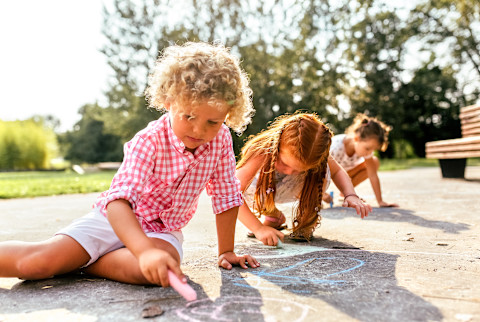Mallika Chopra Wants You To Stop Labeling Your Kids — Here's Why

We all take on a lot of labels throughout our lifetime. It can come in the form of our jobs (writer, practitioner, nutritionist, project manager), our hobbies and passions (runner, yogi, painter), or our relationships to others (mother, daughter, brother, friend). Labels can also reflect things inherent to us, like what gender we identify as and our sexual orientation, race, ethnicity, and nationality.
Then there are external labels, ones usually crafted for us by our environment and those around us—things like hard worker, outgoing, shy, responsible, forgetful, the list goes on. We can internalize these labels or feel misunderstood by them. All the while, how often do you stop and think about how these labels serve and reflect you? What labels do you actually identify with? Which ones do you want to change?
Of course, any question that has to do with identity can feel big, perhaps even overwhelming at times. Mallika Chopra—author, meditation teacher, and daughter of Deepak Chopra, M.D., FACP—argues that for this reason, it's important that we teach kids to start doing so earlier.
Why we need to teach kids to ask the big questions
"It's important that we give kids the tools for empowerment, for knowing themselves, where they come from, and going beyond the labels," says Chopra, whose newest children's book Just Be You (a third in the series of Just Breathe and Just Feel) launched this month.
Kids need to learn this for the same reasons adults do: It's easy to get caught up in the demands of modern life and to start viewing ourselves through lenses that may not color the whole picture. "Kids are growing up in such a high-stress and demand environment. We should teach them ways to take it back to the basics of figuring out who they are," she says. "It's structured about four questions: Who am I, what do I want, how can I serve, and what am I grateful for?"
Big questions, for certain. But asking them allows for a different sort of conversation with kids—one flooded with possibilities and growth: "When we encourage them to ask these questions, and think about what they like—moving away from 'strengths' and 'weaknesses,' and making it more about the journey of building skills and connecting to others," says Chopra.
It's also important to recognize the roles we play in this journey: "From early on, parents, adults, teachers, mentors, start labeling kids right away—much earlier than we think. And labels that other people put on them: She's the responsible big sister, a piano player, tennis player, A-student—these are all labels kids are given," she says. "So the first thing we need to do is to remind kids that they are more than the labels they have. Kids are, on one hand, resilient. But they can also get stuck in the labels they are defining for them."
And while you're at it, perhaps stop and think about how you can ask these questions of yourself: "It's a good lesson for adults too—you're more than your labels," she reminds us.
The takeaway
Often, we shy away from encouraging kids to ask the big questions—thinking they are not ready for it. But what we don't realize is they are already internalizing many lessons that may have to be undone later. So it's better to start this important, mindful work early so they can help themselves later on.
